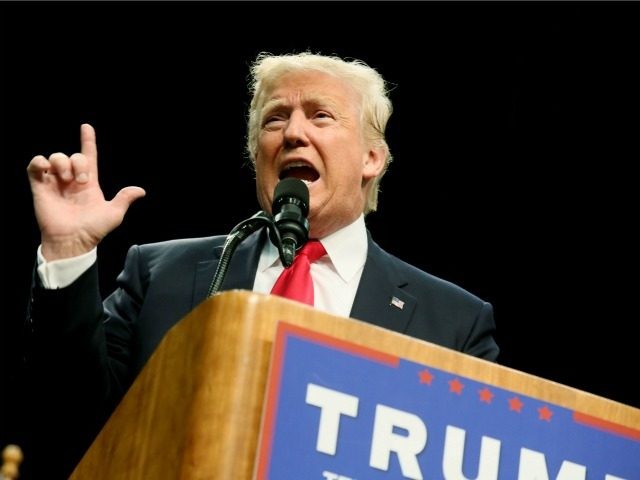A number of new public polls show Donald Trump losing ground in the wake of controversial comments he made about U.S. District Judge Gonzalo Curiel.
Trump has given back much of the support he earned after clinching the Republican nomination. Worse, a poll on the controversy itself finds a strong majority of the public sharply critical of Trump’s remarks.
According to a Morning Consult survey of 1,362 registered voters released Friday, 50 percent of voters think Trump’s comments about Judge Curiel were racist. Another 19 percent of voters said that while the comments weren’t racist, they were unacceptable. Even 56 percent of Republican voters viewed Trump’s remarks as either racist or unacceptable.
The controversy began during a Trump campaign rally in San Diego on May 27. Talking at length about a civil lawsuit involving Trump University, Trump said the judge in the case hadn’t been fair to his side and called the judge himself “Mexican.” In subsequent interviews, Trump suggested that the judge’s heritage might have been a reason he ruled unfairly against Trump, given the presumptive GOP nominee’s position on illegal immigration.
According to the Morning Consult survey, less than one-in-five voters thought Trump’s criticism of the judge was in any way fair. Very few voters believe judges race, ethnicity or gender have a major impact on how they rule. Only 18 percent of voters think either of these characteristics have a major impact. Voters believe the biggest determinates in how a judge rules are precedents of other judges and whether a Republican or Democrat appointed the judge. Over 60 percent of voters believe the partisan nature of a judge’s appointment has some impact on their decisions.
By raising the judge’s ethnicity, instead of his political background, Trump was running against a very strong tide of voter sentiment. Almost half of white voters, 47 percent, believe Trump’s criticism of the judge was racist.
The controversy is clearly having an impact on polling in the overall race between Trump and Hillary Clinton. In the latest survey from Rasmussen, Clinton leads Trump by 4 points. In the middle of May, before the judge controversy, Trump lead Clinton by 5 points. In a little over 2 weeks, Trump lost 4 points of support while Clinton gained 5 points in the Rasmussen poll.
In a Fox News poll released Thursday, Clinton has recaptured a 3-point lead over Trump. Two weeks ago, Trump lead Clinton by 3 points in the Fox poll. Clinton’s support stayed at 42 percent, but Trump’s support dropped 6 points to just 39 percent.
Every poll conducted since Trump’s remarks about Judge Curiel shows Clinton leading Trump by 3-8 points. Prior to Trump’s comments, the GOP nominee led 3 out of 6 public polls.
The most perplexing aspect of this Trump controversy is that it was self-inflicted. Bryon York described the event where Trump raised the issue of Judge Curiel:
In a speech that went a little less than an hour, Trump spent more than ten minutes talking about Trump University. Ten minutes is a lot of time. It was far more, for example, than Trump spent talking about jobs — one week before a terrible jobs report raised serious questions about the recovery. Ten minutes was more than Trump spent talking about illegal immigration, his signature issue. Or veterans, a recent favorite. Or even, astonishingly, the damning State Department report on Hillary Clinton’s email scandal.
No, Trump spent more time talking about the Trump University lawsuit than all of those. He discussed individual plaintiffs by name. He discussed various law firms. His opinion on summary judgment. And more. And, in the course of his extended remarks, Trump said of Curiel, “So what happens is the judge, who happens to be, we believe, Mexican, which is great. I think that’s fine…”
It should be noted that Trump’s criticism of the judge and any possible ethnic bias in his rulings involves a civil lawsuit against Trump, rather than a larger question involving a constitutional principle. Trump was not questioning whether Justice Curiel was able to objectively rule on issues involving Obama’s executive orders on amnesty, for example, or gun rights, privacy, due process, transgender bathrooms, abortion or a host of other judicial issues.
Trump’s criticisms, in other words, involved judicial rulings in a civil case where Trump himself has a vested interest. Some voters may believe a judge’s race, ethnicity or gender would have an impact in a case where those issues were raised. Very few, though, are prone to believe that a judge would be impacted by a perceived personal bias.
The case itself, involving private claims of fraud surrounding the eponymous Trump University, had been raised repeatedly during the Republican primary contest. Trump’s primary opponents had even run ads about the case, to almost no effect on Republican primary voters. Voters, at least in the primary, had already shown that the case didn’t concern them when they decided how to vote.
Trump has ascended to the Republican nomination by showing a close connection to issues that most animate a large number of voters. He raised, and addressed, issues that had been long ignored by the political classes of both parties. Trump’s talent was nowhere to be seen on this matter, though.
According to every poll, the state of the economy is the top concern for voters, by a significant margin. Voters believe, also by a significant margin, that Trump is better prepared to tackle the economy than Hillary Clinton. Every moment Trump spends talking about issues outside of the economy is a moment he is likely losing support.
At the San Diego rally, Trump lost the script that allowed him to catapult to the top of the Republican field. He can’t afford to lose it again.

COMMENTS
Please let us know if you're having issues with commenting.